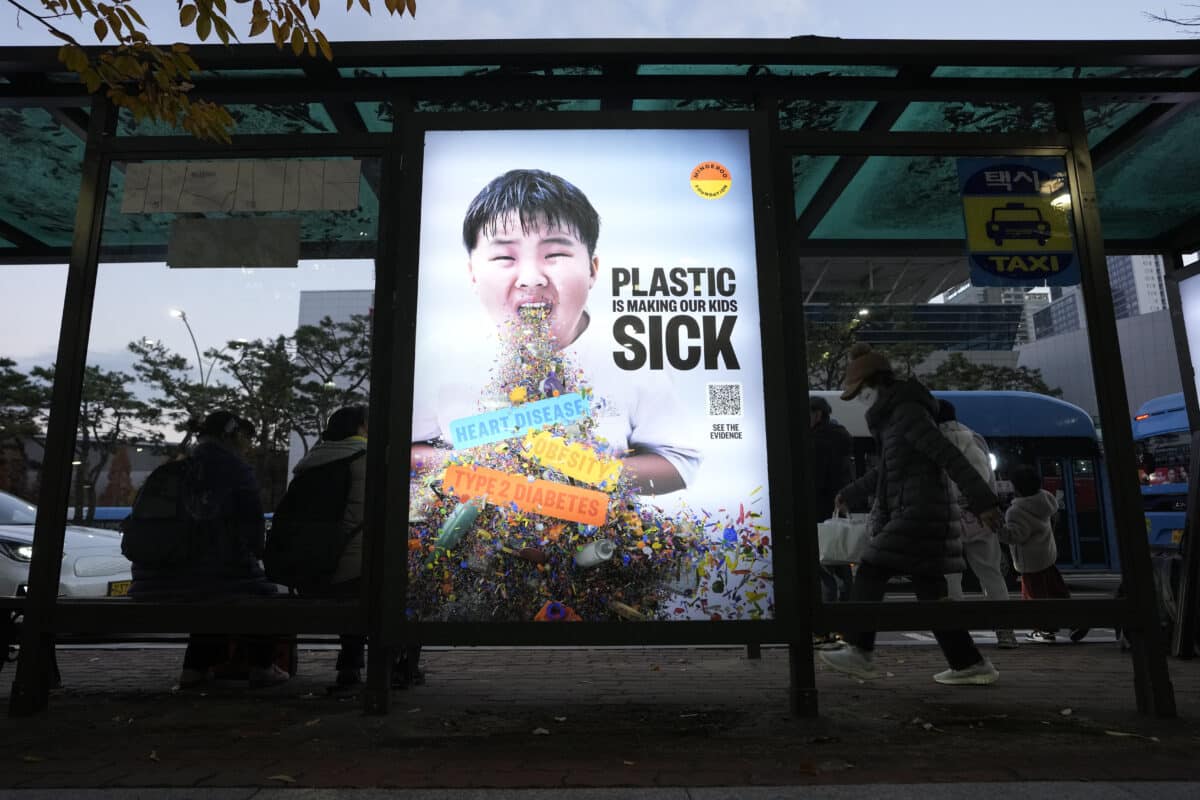
A display board shows a call for a reduction in plastic production during the fifth session of the Intergovernmental Negotiating Committee on Plastic Pollution, at a taxi station in Busan, South Korea, Saturday, Nov. 30, 2024. —AP Photo/Ahn Young-joon
BUSAN, South Korea — The world’s nations will wrap up negotiating a treaty this weekend to address the global plastic pollution crisis.
Their meeting concludes Sunday or early Monday in Busan, South Korea, where many environmental organizations have also flocked to push for a treaty to address the volume of production and toxic chemicals used in plastic products.
Article continues after this advertisementGreenpeace said it escalated its pressure Saturday by sending four international activists to Daesan, South Korea, who boarded a tanker headed into port to load chemicals used to make plastics.
FEATURED STORIES GLOBALNATION Trump threatens 100% tariff on the BRIC bloc of nations GLOBALNATION Teodoro: Focus on PH goals, not China’s GLOBALNATION Trump taps Charles Kushner, father of his son-in-law, as envoy to FranceREAD: Ending global plastic pollution
Graham Forbes, who leads the Greenpeace delegation in Busan, said the action is meant to remind world leaders they have a clear choice: Deliver a treaty that protects people and the planet, or side with industry and sacrifice the health of every living person and future generations.
Article continues after this advertisementHere’s what to know about plastics:
Article continues after this advertisement Every year, the world produces more than 400 million tons of new plasticThe use of plastics has quadrupled over the past 30 years. Plastic is ubiquitous. And every day, the equivalent of 2,000 garbage trucks full of plastic are dumped into the world’s oceans, rivers and lakes, the UN said. Most nations agreed to make the first global, legally binding plastic pollution accord, including in the oceans, by the end of 2024.
Article continues after this advertisement Plastic production could climb about 70% by 2040 without policy changesThe production and use of plastics globally is set to reach 736 million tons by 2040, according to the intergovernmental Organization for Economic Co-operation and Development.
Panama is leading an effort to address the exponential growth of plastic production as part of the treaty, supported by more than 100 countries. There’s just too much plastic, said Juan Carlos Monterrey, head of Panama’s delegation.
Article continues after this advertisement“If we don’t have production in this treaty, it is not only going to be horribly sad, but the treaty may as well be called the greenwashing recycling treaty, not the plastics treaty,” he said in an interview. “Because the problem is not going to be fixed.”
China, the United States and Germany are the biggest plastics playersChina was by far the biggest exporter of plastic products in 2023, followed by Germany and the US, according to the Plastics Industry Association.
Together, the three nations account for 33 percent of the total global plastics trade, the association said.
The United States supports having an article in the treaty that addresses supply, or plastic production, a senior member of the US delegation told The Associated Press Saturday.
Most plastic ends up as wasteLess than 10 percent of plastics are recycled. Most of the world’s plastic goes to landfills, pollutes the environment, or is burned.
Sarah Dunlop, head of plastics and human health at the Minderoo Foundation, said chemicals are leaching out of plastics and “making us sick.”
The International Indigenous Peoples Forum on Plastics held an event about the impact of plastics Saturday on the sidelines of the talks. They want the treaty to fully recognize their rights, and the universal human right to a healthy, clean, safe and sustainable environment. Juan Mancias of the Carrizo/Comecrudo Nation in Texas spoke about feeling a spiritual connection to the land.
“Five hundred years ago, we had clean water, clean air and there was no plastics,” he said. “What happened?”
Many plastics are used for packagingAbout 40 percent of all plastics are used in packaging, according to the UN. This includes single-use plastic food and beverage containers—water bottles, takeout containers, coffee lids, straws and shopping bags—that often end up polluting the environment.
UN Environment Program Executive Director Inger Andersen told negotiators in Busan the treaty must tackle this problem.
Subscribe to our daily newsletter
“Are there specific plastic items that we can live without, those that so often leak into the environment? Are there alternatives to these items? This is an issue we must agree onhot646,” she said.
READ NEXT After Aleppo, Syrian insurgents advance to a nearby province Israeli airstrike in Gaza kills World Central Kitchen workers EDITORS' PICK House orders release of VP aide Lopez VP Duterte tells Filipinos on Bonifacio Day: ‘Fight for freedom’ Trump announces loyalist Kash Patel as choice to lead FBI Aquino kin: Keep Ninoy, Edsa out of Marcos-Duterte feud Hamas military arm releases new video of Israeli hostage in Gaza Pagasa forecasts rainy weather for Sunday in most parts of the country MOST READ PCG spots 3 Chinese research vessels in eastern PH economic zone PMA: 764 female military officers owe careers to Rasul Leyte mayors, bishop appeal for propriety from VP Sara Duterte ICC crowdsourcing evidence vs Duterte Follow @FMangosingINQ on Twitter --> View comments